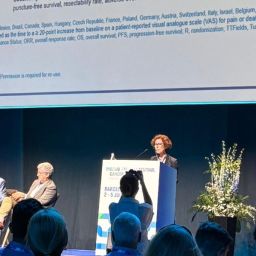
- Presented at ESMO Congress 2024, results from the phase 1b CodeBreaK study in patients with KRAS G12C-mutated metastatic colorectal cancer show that the addition KRAS G12C inhibitor sotorasib plus anti-EGFR therapy panitumumab to chemotherapy in the first-line setting demonstrated a tolerable safety profile and promising response rates.
- A phase 3 study, CodeBreaK 301, is currently enrolling patients to evaluate this combination in first-line versus standard of care.
Carried out in collaboration with investigators at VHIO, the first data set on the use of the KRAS G12C inhibitor combined with panitumumab and FOLFIRI chemotherapy as first-line treatment in patients with KRAS G12C-mutated metastatic colorectal cancer (mCRC) has been presented today at the European Society for Medical Oncology Congress 2024, 13 – 17 September, Barcelona. Data presented by lead author Salvatore Siena, Full Professor of Medical Oncology at the Università degli Studi di Milano (la Statale) and Director of the Niguarda Cancer Center in Milan, have demonstrated a tolerable safety profile and encouraging response rates.
The KRAS G12C is found mutated in approximately 3% of patients with colorectal cancer. “The small molecule drug sotorasib selectively and irreversibly targets KRAS G12C and has previously shown modest clinical activity and no dose limiting toxicity as monotherapy in patients with heavily pretreated KRAS G12-mutated mCRC,” said Elena Élez, a Medical Oncologist at the Vall d’Hebron University Hospital, Head of VHIO´s Colorectal Cancer Group, and a co-author of this present study.
“KRAS G12C inhibition can lead to the accumulation of the epithelial growth factor receptor, EGFR, which can generate resistance to sotorasib. The combination of sotorasib with EGFR inhibitors such as panitumumab can therefore increase antitumor activity and counteract mechanisms of escape,” added Élez.
Data presented today are from a subprotocol of the CodeBreaK 101 study that includes cohorts of patients with mCRC to evaluate the combination of sotorasib with panitumumab plus chemotherapy.
This present study included forty patients with treatment-naive KRAS G12C-mutated mCRC. The most common treatment adverse events included neutropenia, dermatitis acneiform, and diarrhea. Results showed a tolerable safety profile, and 30 patients had confirmed partial responses with an overall response rate of 75%, a disease control rate of 93% and median tie to response of 1.5 months.
“Based on these encouraging data, the international phase 3 CodeBreaK 301 evaluating the combination of first-line sotorasib plus panitumumab and FOLFIRI in patients with KRAS G12C-mutated mCRC is now underway. Results could promise a new, more effective treatment strategy in these patients,” concluded Elena Élez.
###
*Session details
European Society for Medical Oncology Congress 2024, 13-17 September, Barcelona, Spain
Proffered paper session 2: GI tumours, lower
Date: Sunday, 15.09.2024
Session Time: 14:45 – 16:15h
Chairs: Michel P. Ducreux (Villejuif, France, CEDEX), Chiara Cremolini (Pisa, Italy)
505O – Sotorasib (soto), panitumumab (pani) and FOLFIRI in the first-line (1L) setting for KRAS G12C–mutated metastatic colorectal cancer (mCRC): Safety and efficacy analysis from the phase Ib CodeBreaK 101 study
Speaker: Salvatore Siena (Milan, Italy)

























